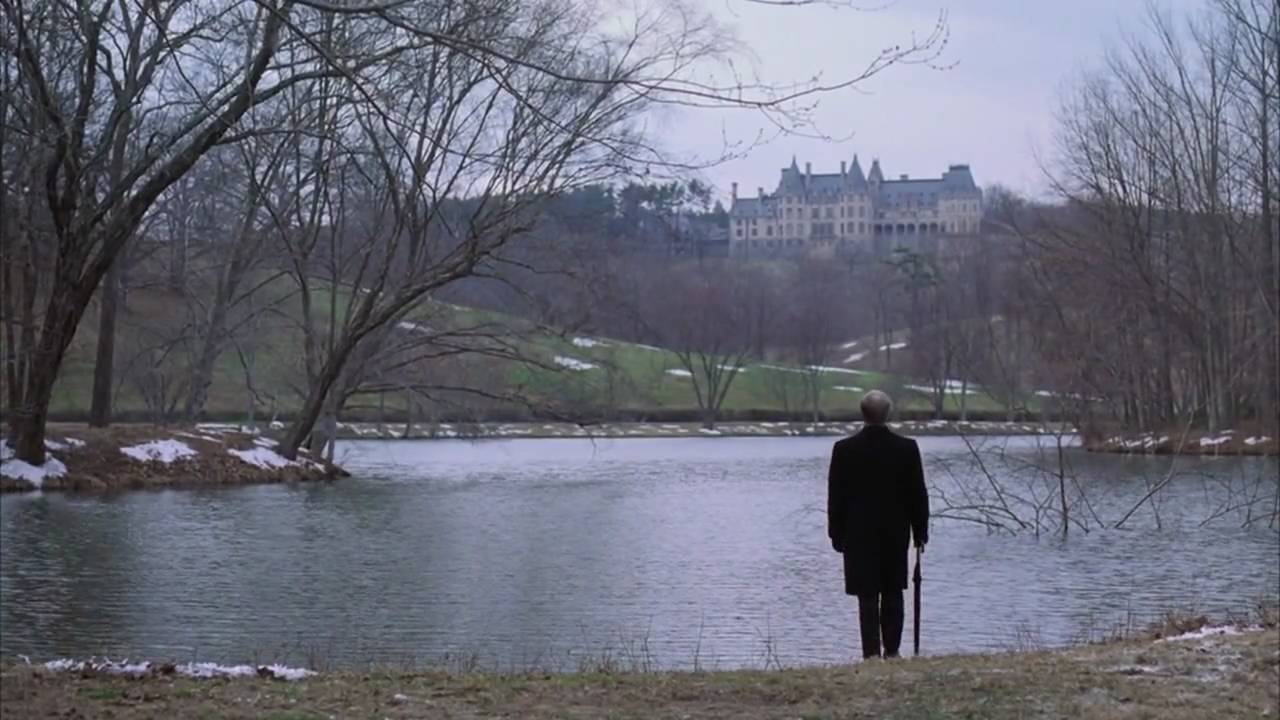Although more than 35 years have passed since it came out, “Being There,” which is based on Jerzy Kosiński’s novel of the same name, remains a brilliant satire with timeless insight on media and celebrity. Gently strolling along with its adamantly elusive hero, the movie is funny and absurd as its main character quickly and unbelievably rises from obscurity to nationwide fame. I could not help but chuckle during my recent viewing, admiring again how the film slyly makes sharp points on its subjects via inspired comic moments to be cherished.
Its hero is an illiterate gardener named Chance (Peter Sellers). The movie opens with how he begins another usual day of his insulated daily life within a cozy house located somewhere in Washington D.C., where he has lived for many years since he was brought by the owner of the house when he was very young. He wakes up shortly after a TV alarm in his bedroom is set off, and then he goes through his morning routine, including taking care of plants in the greenhouse. He then waits for breakfast to be brought by an old black maid, while passively watching whatever is shown on a small TV on the table.
When the maid comes to Chance, she is visibly disturbed as she has just found that the owner of the house, called ‘the old man,’ is dead. But, to our small amusement, Chance does not respond much to this sad news. Even when he later goes upstairs and then sees the dead body of the old man, he does not look like he is feeling anything except, probably, curiosity, and then he occupies himself by watching TV. He just sticks to what he likes most, not interested in much that may be beyond his understanding.
Chance continues to do his gardening work as usual, but <span class="il" <theresoon comes an inevitable change. Two lawyers handling the old man’s estate come to the house, and they notify him that he should leave. He acquiesces without any complaint, packs his suitcase the next day, and then walks out of the house for the first time in his life while wearing the old man’s suit as before. As he walks around the surrounding areas of Washington D.C., the movie makes a humorous nod to “2001: A Space Odyssey” (1968) through the pop version of Richard Strauss’ “Also sprach Zarathustra,” and Chance’s child-like attitude is instantly linked with the image of the Star Child of “2001: A Space Odyssey” in our mind. Everything looks new and wondrous to this man-child, and there is a priceless moment of self-recognition when he sees himself on a displayed TV connected with a video camera and then tries to have some fun with that.
And that is when he happens to encounter Eve Rand (Shirley MacLaine), the wife of Benjamin Rand (Melvyn Douglas), a dying old man who is also one of the most powerful industrialists in the country. Due to his minor leg injury caused by Eve’s car, Eve brings Chance to a huge manor where she and her husband live, and, after accidentally mishearing his name, she introduces him as ‘Chauncey Gardiner’ to her husband and others in the manor. Chance is mistaken for a man of substance, and Rand, who comes to like Chance a lot after having dinner with him, is willing to give some boost to his new friend as a prominent kingmaker with many strings to be pulled. In fact, he is a very close friend of the US President, who is about to visit.
This is surely a classic case of mistaken identity, which has been utilized in countless comedy films, and we get lots of wry fun as the situation surrounding Chance becomes more absurd step by step. When he is asked about an economic policy by the President, Chance gives a plain response consisting of bland horticultural terms (“As long as the roots are not severed, all is well. And all will be well in the garden.”) But the President and Rand interpret it as a wise, no-nonsense comment on the national economy, and the President even embellishes it further when he makes a speech at the following public conference. Once he mentions Chauncey Gardiner during his speech, everyone is curious about who the hell Chauncey Gardiner is. Chance soon becomes a new celebrity in town, touted as a brilliant and interesting man to watch.
Director Hal Ashby, an idiosyncratic filmmaker who had a remarkably productive period during the 1970s with a string of acclaimed works including “The Last Detail” (1973), “Bound for Glory” (1976), and “Coming Home” (1978), trusts us to get this hilarious irony for ourselves. He and his cinematographer Caleb Deschanel maintain a calm, muted tone throughout the film, and everything on the screen is presented with phlegmatic realism. Like its hero, the movie sticks to its neutral position without telling us how to respond, and many comic moments generated from Chance’s unbelievable social/political ascent subtly deliver biting messages along with a sly sense of humor. As a cipher doling out simple, banal words with no apparent inclination, Chance is a perfect blank figure for not only media but also politics, and he is even considered as a strong candidate for the upcoming US Presidential election later in the story. This might look silly in the 1970s, but it does not look that outrageous these days considering the absurd superficiality of George W. Bush, and the horrifying rise of Donald Trump, who, as many people pointed out, frequently talks like an evil twin of Chance, nurtured by hateful right-wing media companies.
From time to time, the movie goes for broader farcical moments, which are not as successful as subtler ones in the film. A subplot involved with the President’s sexual dysfunction caused by the prospect of Chance being his possible political rival is rather underdeveloped, and the one associated with Eve’s increasing sexual obsession with Chance feels too blatant at times compared to the serene ambiance of the movie, though it is uproarious to watch her going all the way with her another misinterpretation of Chance’s words. When a woman throws an acerbic comment on Chance’s TV appearance, it makes its point on race a little too directly, but I must admit that it still rings true: “Yes, sir, all you’ve gotta be is white in America, to get whatever you want.”
The movie keeps its overall tone mostly intact thanks to Sellers, who was deservedly Oscar-nominated for his committed performance. As a chameleonic performer of anonymous comic persona (he once said, “When I am not playing a role, I am nobody”), he instinctively saw that Chance was a role he was born to play when he encountered Kosiński’s novel, and gave what would be remembered as the final great performance in his distinguished career. Yes, his acting in the film is essentially one-note, but it is a finely calibrated single note, which ably carries the movie, and his character comes to function as a sort of mirror to project not only others around him but also ourselves. We are amused when observing how other characters vastly overestimate Chance as believing whatever they want to see from him, but then we are also reminded that we may not be so different from Chance, considering how often we mindlessly absorb those endless streams of media soundbites.
<span class="il" <thereIts thought-provoking finale will linger on you for a long time, even though the spell of this confounding moment is broken to some degree by a series of outtakes shown during the following end credits. Is it merely another unbelievable moment of sheer luck? Or, does it mean that Chance is actually a lot more than what we have observed from him? Regardless of how we should interpret it, he will simply be there, as usual.











